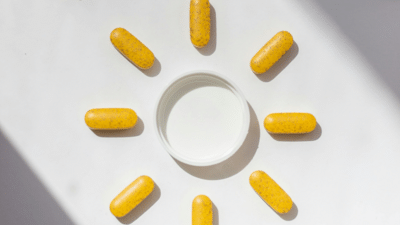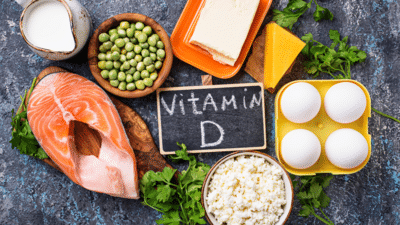In recent years, Vitamin D has gained quite the popularity and is a hot topic in the health and wellness industry for all the good reasons. Vitamin D aka the “sunshine vitamin”, plays a key role in keeping the bones strong, immunity sharper and the mood, well perfectly balanced.
One is likely to come across different labels, when they walk inside a pharmacy such as : Vitamin D, Vitamin D2, Vitamin D3 and this is where the confusion actually starts.
Video
Are all the same? Which one to take?
Let us decode this today, which version is best for our body.
Vitamin D

Vitamin D is a fat-soluble vitamin that helps the body absorb calcium and phosphorus, two of these are essential for bone strength. It plays a crucial role in immune regulation, mood stability and hormonal balance.
While sunlight is its most important source and one of the natural ways for the body to absorb and produce vitamin D, is might not always be reliable. That is where dietary sources come into play:
Sources of Vitamin D:

When our skin is exposed to sunlight (UVB rays), our bodies produce a natural form of Vitamin D, known as cholecalciferol. Also found in certain plant-based foods as well.
Vitamin D3 has: D3 is more easily absorbed by the body as compared to other forms of Vitamin D (Especially D2). It is known to stay in the bloodstream longer than most forms of Vitamin D. Growing research says that it is better at raising blood levels and sustains 25 (OH) D, the circulatory form of vitamin D.
Natural sources of Vitamin D3
Doctors suggest that it is more effective when taken with meals. It typically comes in different formats such as softgels, sprays or drops. Choose the right from and dosage which varies from 1,000-2,000 IU/day (safest for most people)
Top benefits of Vitamin D
Which one to consume
While both Vitamin D and D3 fall under the same category, they are not equally effective. D3 is the form that is naturally produced by the body from sunlight and is proven to be more efficient at raising and maintaining healthy vitamin d levels in the body.
If one’s aim is to have better absorption, stronger immunity and healthier bones, Vitamin D3 would be a smarter choice.
One is likely to come across different labels, when they walk inside a pharmacy such as : Vitamin D, Vitamin D2, Vitamin D3 and this is where the confusion actually starts.
Video
Are all the same? Which one to take?
Let us decode this today, which version is best for our body.
Vitamin D
Vitamin D is a fat-soluble vitamin that helps the body absorb calcium and phosphorus, two of these are essential for bone strength. It plays a crucial role in immune regulation, mood stability and hormonal balance.
While sunlight is its most important source and one of the natural ways for the body to absorb and produce vitamin D, is might not always be reliable. That is where dietary sources come into play:
Sources of Vitamin D:
- Oily fish (Salmon, trout)
- Egg yolks
- Fortified foods such as breakfast cereals and fat spread
- Mushrooms
- Fortified plant milk (almond, soy, oat milk)
When our skin is exposed to sunlight (UVB rays), our bodies produce a natural form of Vitamin D, known as cholecalciferol. Also found in certain plant-based foods as well.
Vitamin D3 has: D3 is more easily absorbed by the body as compared to other forms of Vitamin D (Especially D2). It is known to stay in the bloodstream longer than most forms of Vitamin D. Growing research says that it is better at raising blood levels and sustains 25 (OH) D, the circulatory form of vitamin D.
Natural sources of Vitamin D3
- Sunlight (15–30 minutes, a few times per week)
- Fatty fish (salmon, mackerel, sardines)
- Egg yolks
- Cod liver oil
- Fortified dairy or plant milks
- Supplements (cholecalciferol-based)
Doctors suggest that it is more effective when taken with meals. It typically comes in different formats such as softgels, sprays or drops. Choose the right from and dosage which varies from 1,000-2,000 IU/day (safest for most people)
Top benefits of Vitamin D
- It supports bone health
- It boosts immunity
- Improves mood and mental health
- Supports muscle strength and function
- It is considered essential during pregnancy
Which one to consume
While both Vitamin D and D3 fall under the same category, they are not equally effective. D3 is the form that is naturally produced by the body from sunlight and is proven to be more efficient at raising and maintaining healthy vitamin d levels in the body.
If one’s aim is to have better absorption, stronger immunity and healthier bones, Vitamin D3 would be a smarter choice.
You may also like

Gujarat to host 70th Filmfare Awards in 2025; state signs MoU with worldwide media

Jessie J to undergo more surgery after cancer diagnosis as she rearranges tour

'Egregious': Russia's attack on Ukraine receives backlash- Here's what nations said

64th Subroto Cup: Assam team beats team from West Bengal to win Junior Girls' title

Southend fire LIVE: At least one injured in horror blaze near theatre as road shut






